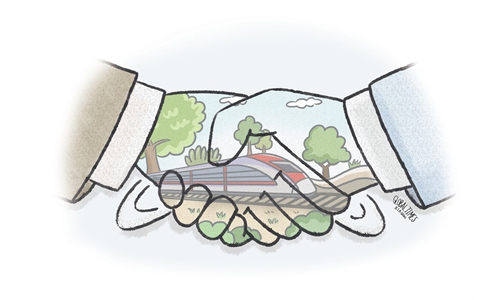China's Piraeus Port partnership under the BRI upgrade a significant element for future Greek economy: official

A view of the Piraeus Port in Greece Photo: VCG
Editor's note:
In recent years, China and Greece have continuously promoted high-quality joint construction of the China-proposed Belt and Road Initiative (BRI) and cooperation between China and Central and Eastern European countries (CEEC). Among all cooperation, port cooperation in particular encapsulates win-win results and helps the two major shipping countries to secure the world supply chain and prosper together. Global Times reporter Yin Yeping (GT) had an exclusive interview with the current Greek Secretary General for Maritime Affairs and Ports, Evangelos Kyriazopoulos (Kyriazopoulos), who shared with GT how China-Greece cooperation bears fruit under the joint construction of BRI and what to look forward next under this cooperation.

Evangelos Kyriazopoulos Photo: Ma Mengyang/GT
GT: In 2016, COSCO Shipping Group acquired a 67 percent stake in the Piraeus Port Authority, and since then, it has taken over the operations of the port. Today, Piraeus has become the largest container transshipment port in the region. How do you evaluate the development brought to the local area by the operation of the Piraeus Port by Chinese enterprises?
Kyriazopoulos: COSCO's investment in Piraeus Port proved to be a successful move for the benefit of both countries so far. Upon the completion of the acquisition in October 2021, the major port of Greece is today a regular call for cruise liners, a significant base for car-carrying vessels, a maintenance center and a constantly growing terminal with annual freight capacity of 7.2 million TEUs.
With a coastline of more than 24 kilometers and a total area of more than 5 million square meters, the port managed to swiftly reveal its potential and support its role today as a transport, commercial and logistic hub for tourism and communication, connecting the Greek islands with the mainland, serving as well as a transit trade hub for the Balkan and Black Sea countries. Latest figures show that since 2021 Piraeus is among the top container ports in the Mediterranean and one of the largest ports for integrated services in Europe. These results may well be impressive at the larger scale, but the impact to the local economy and competitiveness certainly cannot be underestimated. For the same year, the port's added value for the Greek economy was estimated at 0.76 percent of the country's GDP.
Additionally, with 17.4 million euro ($18.3 million) in social security contributions and 27.6 million euro in taxes, the port operator has contributed 0.06 percent to the state's tax revenues. Nearly 1.000 local suppliers were paid around 60 million euro for support services.
Figures from 2021 shows that the staff employment rate from the neighboring municipalities reached 43 percent in 2021 and in total COSCO created 4,279 direct and indirect jobs, equal to 0.12 percent of total employment in the country, thus providing income to more than 11,000 citizens.
It is important to mention also the port's significant Corporate Social Responsibility Program, proving that among the port operator's priorities is to sustain a balance between economic growth and its impact on environmental, social and governance levels.
There is certainly room for improvement, due to the fact that the investment plan in Piraeus Port has not been materialized yet, due to various issues around red tape and legal conformity issues. The government and the Ministry specifically are constantly providing their support to facilitate the commonly agreed investments and accelerate progress and await further dissemination of the results to the local economy and society. These developments and commitments are expected to be fully fulfilled in the medium-short run, as internal competition among ports is steadily growing and consortia of top performance port operators from Europe gradually find their placement in the port system.
GT: Greece occupies an important position in the global shipping industry due to its unique geographical location. For China, working with Greece in ports and maritime affairs will benefit trade between China and Greece, as well as trade between China and Europe. However, there are always voices trying to undermine this mutually beneficial bilateral cooperation, such as speculating on military uses of the Piraeus Port or suggesting that China-Greece maritime cooperation is detrimental to regional peace and stability. How do you view these voices?
Kyriazopoulos: Today, the cooperation with China in the upgrade of Piraeus Port and its connection with the BRI via the South Eastern European Corridor is a significant element for the future projections of the Greek economy. Investment in total since 2015 surpasses 15 percent of GDP and nowadays China has become Greece's third-largest trading partner and its largest trading partner outside of the EU.
The geostrategic importance of our nation not only as a member of the European Union, but also for all major global trade players, has triggered reactions at various levels, maintaining a debate over China's external trade policy. Our partner through BRI is officially committed to an open global economy. The vision behind this is to move economic globalization toward win-win results, and inclusiveness. China has signed nearly 40 bilateral maritime agreements. Although all these agreements do not have a binding character in legal terms, they certainly show intention for extensive cooperation and collaboration.
GT: What cooperation has taken place between China and Greece in the maritime field? From the perspective of Greece, in which areas has this cooperation brought benefits? In the future, what areas does Greece hope to further cooperate with China in maritime affairs including shipping, ports, and logistics?
Kyriazopoulos: China and Greece are long lasting partners for more than half a century. Upon the signature of the MOU in August 2018 to mutually advance the construction of the Belt and Road and becoming a full membership of China-CEEC cooperation since April 2019, bilateral economic and trade cooperation is speeding up. Maritime transportation is one of the fields of mutually beneficial cooperation. As stated before, Piraeus Port ranked among the top four in Europe within just a few years, creating more than 10,000 jobs indirectly, contributing more than 1.4 billion euro to the national economy.
GT: China's shipbuilding industry accounted for 72.6 percent of the international market's new order volume in the first half of this year. What is your perspective on China's international leadership in the shipbuilding sector? What are your expectations for strengthening cooperation with the China in this area?
Kyriazopoulos: The shipbuilding market size is estimated at $145.67 billion in 2023, and is expected to reach $184.50 billion by 2028. It is expected to rise over the forecast period due to increasing seaborne trade and economic growth, advancing energy consumption, the demand for eco-friendly ships and shipping services, and the entrance of robotics in shipbuilding. East Asian area dominates shipbuilding, with China, Japan, and South Korea being the world's top shipbuilding nations. Among them China is indeed the worldwide shipbuilding powerhouse. Our partner's policies aim to increase its global competitiveness by targeting higher value-added industries. The blueprint of this ambition has been set out in the Five-Year Plans, the BRI and the "Made in China 2025" strategy to be realized with a holistic and cross-sectoral strategy.
Since 2000, Greek shipowners have bought or ordered more than 1,500 ships from Chinese shipyards, worth $50 billion. On the other hand, more than half of China's energy resource imports, such as crude oil and other bulk commodities, are transported by Greek ships. Within the last two years the ship repair sector of Piraeus Port is growing steadily in terms of number of ships as well as in total occupancy days.
Despite the fact that shipbuilding industry cooperation is part of BRI agreement it remains untapped. Promising cooperation agreements have been signed recently to bring closer the shipping centers of our country and attract Chinese ship building yards and know how to invest in Greece. We are confident that similar initiatives will continue and a China-Greece economic "Silk Road" will support the recovery and modernization of the ship-building industry in our country.
GT: This year marks the 10th anniversary of the Belt and Road Initiative (BRI). Greek Prime Minister Kyriakos Mitsotakis has expressed on multiple occasions that Greece actively welcomes the BRI and is willing to further deepen practical cooperation between Greece and China under the initiative. How should the governments and enterprises of both countries make good use of the leading and exemplary role of the Piraeus Port project while seeking further joint development in the broader maritime and island affairs?
Kyriazopoulos: Over recent years, especially with the launching of the BRI initiative our bilateral relations are on a continuous upward trajectory. Olive oil, dairy product, wine and other high-quality products were transported to China and are increasingly gaining popularity among Chinese consumers.
Within 2023 Beijing and Shanghai are again connected with direct flight with Athens. Prime Minister Mitsotakis affirmed that the economy is on a dynamic course and on a high growth trajectory.
Greece is implementing a series of important and crucial structural reforms that have made us a much more interesting and attractive investment destination for foreign capital. We have witnessed the fastest reduction in debt as a percentage of GDP of any European country and expect to have a primary surplus as well as to regain the investment grade within 2023.
What the Piraeus case reveals is that mutual understanding and respect give birth to mutual learning. This example may very well expand on all other sectors with maritime dimension, and further promote the "soft connectivity" of development plans along with the "hard connectivity" on infrastructure in ship building industry, ports and logistics sectors.



